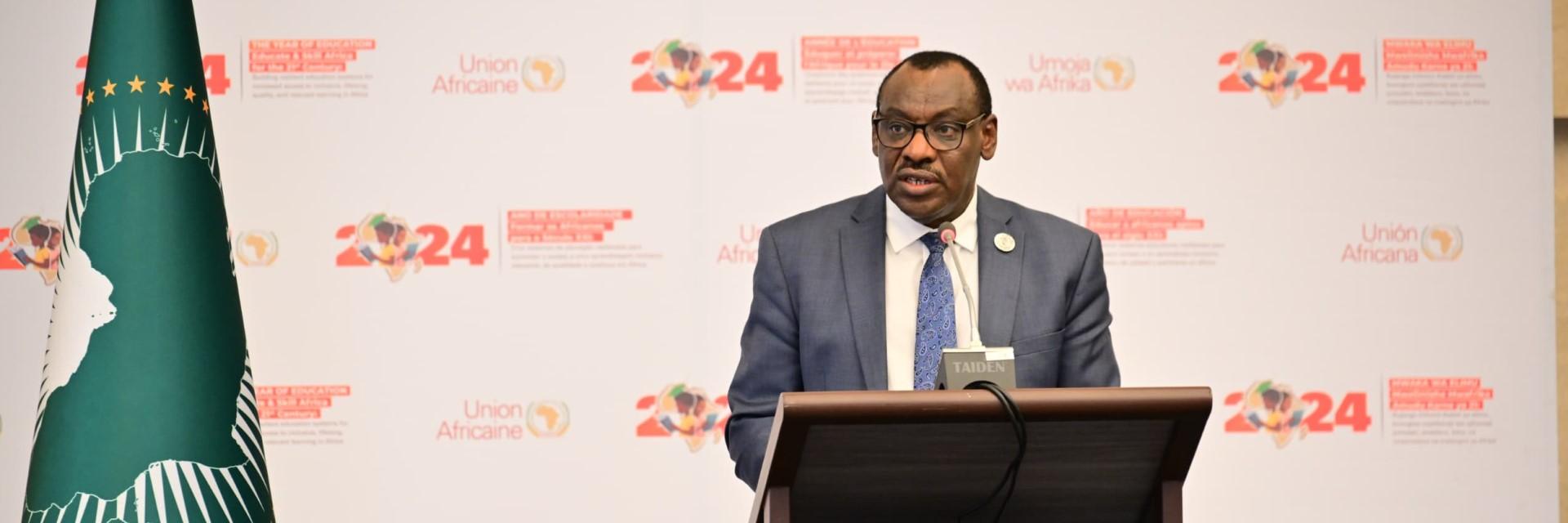Pre-launch of the African Union Theme for 2024
“Educate an African fit for the 21st Century: Building resilient education systems for increased access to inclusive, lifelong, quality, and relevant learning in Africa.”
Seizing the moment to transform education in Africa: from commitments to action
Statement
By
Claver Gatete
United Nations Under-Secretary-General and
Executive Secretary of the Economic Commission for Africa (ECA)
Addis Ababa
16 February 2024
Your Excellency, Azali Assoumani, President of the Union of Comoros and Chair of the African Union
Your Excellency, Sahle-Work Zewde, President of the Federal Democratic Republic of Ethiopia
Your Excellency, Luiz Inácio Lula da Silva, President of Brazil
Your Excellency, Moussa Faki Mahamat, Chairperson of the African Union Commission,
Your Excellency, Dr. Monique Nsanzabaganwa, Deputy Chairperson of the African Union Commission,
Honorable Ministers and Heads of Delegations,
Distinguished delegates,
Ladies and gentlemen
It gives me great pleasure to join you at this pre-launch event on the African Union theme of the year.
The call to move from commitment to action reflects the urgency of the task ahead of us.
High quality education and lifelong learning are the catalysts to achieve Sustainable Development Goals (SDGs) and Agenda 2063.
When individuals are equipped with the right knowledge and skills, they are empowered to make informed decisions.
They can lead healthy lives.
They can build resilience when faced with development challenges.
However, we know that our education systems require urgent reforms if we are to get to the Africa We Want.
Only education unusual will deliver the SDGs and Agenda 2063 for Africa.
In this 21st century, it is not okay that one in five children of school age do not attend school.
Excellencies,
Ladies and gentlemen
The skillset of the future global workforce has skewed towards technology.
Digitalisation is now playing an increasing role.
In addition, recent global shocks, like Covid-19, have shown the benefits of more skills in data analytics, behavioural science, and foresight analysis.
They help governments to develop better policies and capabilities to respond to unknowns and build resilience.
The actions we take today will determine if Africa gains or loses.
We need education programmes that improve affordability, access, quality institutional credibility, and delivers employable skills and entrepreneurship attributes.
It also means that our education must enable our member States to accelerate the implementation of the SDGs and Agenda 2063.
We, therefore, cannot overemphasize the importance of science, technology and innovation, and initiatives that promote technical and vocational education and training.
Indeed, the benefits that Africa can realise by getting our education system right are undeniable.
But we cannot do this if only 2 per cent of African universities are ranked in the top 500 globally in STEM fields (Brookings, 2023).
We will not succeed if women remain under-represented, at less than 30 per cent in high tech domains such as artificial intelligence.
Excellencies,
Distinguished delegates
We must rally all stakeholders to unleash Africa’s transformation through innovation.
But first, we must address the structural barriers that continue to impact educational outcomes.
Especially barriers of inclusivity, affordability, accessibility, and applicability.
Our education systems must also be context specific and leverage the natural comparative advantages of countries.
For example, there is no reason why Chad’s livestock sector cannot be a global competitor on leather goods.
It is not inconceivable to think that Ghanian and Ivorian chocolate cannot, one day, compete with their Swiss equivalent.
The blue economy in Comoros can drive the new frontier for African Renaissance, as called for in Agenda 2063.
These can all be possible if our education systems are aligned with market and societal needs.
Intentional and nurtured partnerships between governments, industries and academic institutions can support knowledge and technology transfer that serve the needs of industrial sectors.
Excellencies,
Distinguished delegates
It is true that we are faced with very constraining fiscal space.
But the opportunity cost of inaction is a far more expensive price to pay.
Securing the necessary resources to reform our education system should not be an either-or situation.
In this regard, private sector also has critical role to play.
We must, indeed, seize this moment to move from commitment to action.
I want to reassure you of ECA’s continued support as we launch this important theme of the year.
I thank you for your kind attention.

